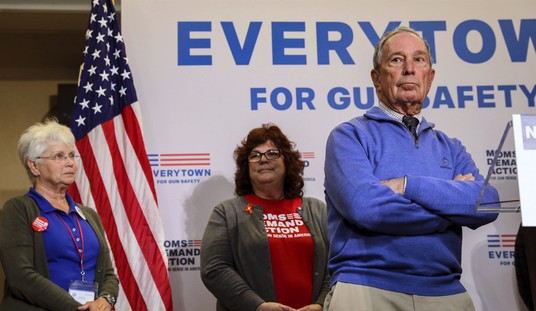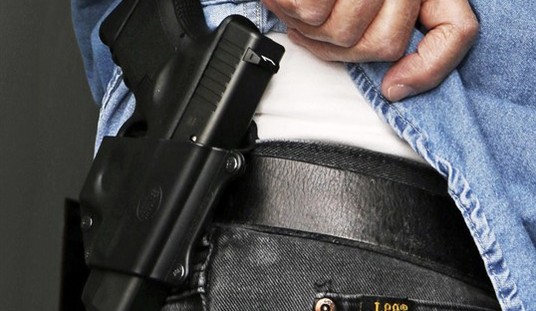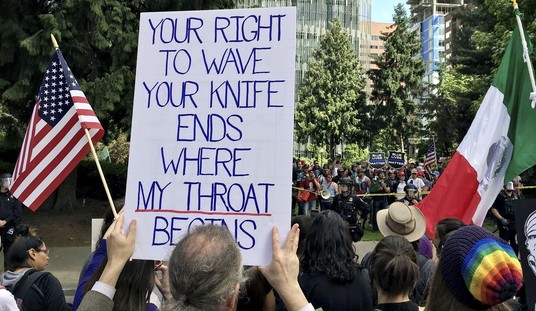I tend to agree that all men and women are created equal. That was a radical notion when Thomas Jefferson wrote it, but today, it's pretty mainstream. However, I also believe that some people do things that make them less than the equal of most. It's why some are tried, convicted, and imprisoned for various offenses.
The punishment for many of those crimes continues after one's release via the denial of certain rights. I don't agree with that, but I get it. However, should they have a pathway to get their rights back?
Based on what I already said, I think they should. Especially if it's clear that they've cleaned up their act and/or were convicted of a non-violent crime.
It seems the Eighth Circuit disagrees with me.
No, said an Eighth Circuit panel in U.S. v. Jackson earlier this year; yesterday, the court refused to rehear the case en banc, so the answer is still no in the Eighth Circuit. Judge David Stras, joined by Judges Ralph Erickson, Steven Grasz, and Jonathan Kobes (a total of four of the eleven judges on the court), dissented from the denial of rehearing:
I have no special affection for felons either, but the Second Amendment does not care. It says what it says, and so do the Supreme Court decisions interpreting it. See generally U.S. v. Rahimi (2024); N.Y. State Rifle & Pistol Ass'n v. Bruen (2022). And what Jackson [II] [the panel decision] says about as-applied challenges conflicts with both.
Start with Rahimi. It was a facial challenge, but the Supreme Court dealt with it by examining whether the statute was "constitutional in some of its applications," including in "Rahimi's own case." It reviewed the historical analogues, surety and going-armed laws, and held that an individual like Rahimi—someone who has been "found by a court to pose a credible threat to the physical safety of another[—]may be temporarily disarmed consistent with the Second Amendment."
If the Court meant to cut off all as-applied challenges to disarmament laws, as Jackson II concludes, it would have been odd to send that message by deciding Rahimi based on how his as-applied challenge would have gone. See id. (stating that "[s]ection 922(g)(8)'s restriction was temporary as applied to Rahimi"); id. (noting that § 922(g)(8) applies "only once a court has found that the defendant represents a credible threat to the physical safety of another"). It would have just announced the law's across-the-board constitutionality and moved on, like Jackson II does.
...
It gets worse. Jackson II turns constitutional law upside down, insulating felon-dispossession laws from Second Amendment scrutiny of any kind. "Facial challenges are disfavored." But after Jackson II, they are the only kind a felon may bring. See Jackson II (holding that § 922(g)(1)'s constitutionality does not vary "felony-by-felony" or felon by felon). And now, it is impossible to prevail in one.
Now, I get depriving recidivistic, violent criminals of the right to keep and bear arms. They've established that they're a danger to society and done so repeatedly. Under Rahimi, the Founding-era prohibitions on certain dangerous people being disarmed would likely apply in a case like this.
But what about someone who isn't in that camp?
Under the Eighth Circuit's interpretation of the law and based on earlier precedence, it's basically impossible for someone who was convicted of a felony to get their gun rights restored.
Again, that might be fine if you're talking about someone with a long and relatively recent history of violent crime, but that's hardly the same thing as someone who was convicted of tax evasion 20 years earlier and who has kept their nose clean ever since.
It sounds like this is something Congress may have to address.
Yet with Trump's win and the potential control of Congress in GOP hands, that might be something that can be arranged. After all, the president-elect is a convicted felon, even if the charges look stupid to many of us. He can't lawfully own a firearm despite the fact that he's about to (again) have control of a nuclear arsenal.
It's possible that Congress may decide to address this, in part to benefit Trump but also because his presidency will likely show these prohibitions to be kind of stupid.
Then again, since crime is going to be a major issue, they may not want to deal with the political ramifications of trying to allow convicted felons to get guns, even if it's on a case-by-case basis.







